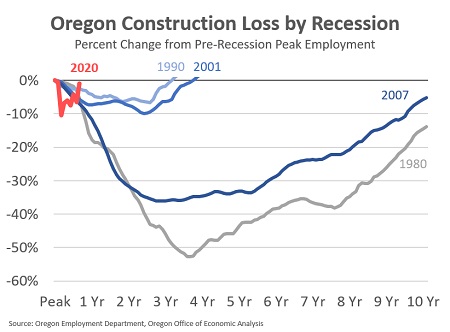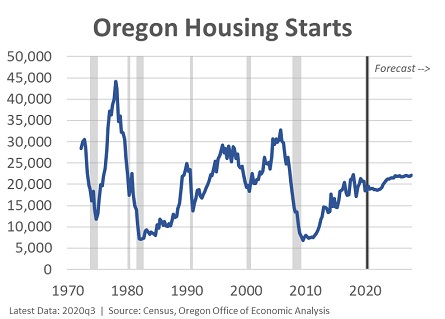Caused in part by government?
As the Oregon Legislature considers several measures to address the housing crisis in Oregon, it's a good time to reflect on Oregon's land use laws and what impact they have had on the supply of housing in Oregon.
The high point for housing starts in Oregon was in the mid-1970s when builders started on nearly 45,000 new units. Despite consistent high demand over the decades since then, housing starts in Oregon have never reached that level. The graph shows how, when beaten down by recession, housing starts struggle to recover to previous levels and since the mid-2010s trended flat. Another watershed event of the 1970s was the passage of Oregon's land use system in 1974.
Like many economic trends, perennially sluggish production in the housing sector has various causes. One of the simplest causes, however, is the reduced inability of builders to acquire buildable land, and when they can acquire it, the cost of the land is so high that it often makes sense to put larger, more expensive properties on it. The biggest cause of this is the decreased supply of buildable land due to land use laws.

According to the Oregon Office of Economic Analysis, the problem lately has been supply. "In fact, one of the largest issues has been that the supply of products has not been able to keep up with the demand. Employment for wood products manufacturing and construction are down, seemingly in expectation that demand would dry up due to the recession. However these goods-producers tied to the housing market are adding jobs and looking for workers to meet the stronger-than-expected demand." In hindsight, the COVID-19 recession is a service sector recession and little else. It's had little effect on housing.
The damage due to fires will surely support something of a rebound by creating demand, but there are legitimate worries over access to raw materials. The Oregon Office of Economic Analysis says, "the wildfires are a complicating economic factor. Early indications are that the amount of timber burned is equal to a quarter or a third of the annual harvest. While certainly not insignificant, this is likely a manageable amount from an industry perspective. Markets should not be overwhelmed with burned logs, driving prices down to the point where it hurts the viability of logging. This is not always the case following large fires. Already, crews began as soon as possible to salvage log private lands before the rain started, and will return to do so next year."
--Staff Reports| Post Date: 2021-01-25 16:13:05 | Last Update: 2021-01-25 17:43:37 |







 According to the Oregon Office of Economic Analysis, the problem lately has been supply. "In fact, one of the largest issues has been that the supply of products has not been able to keep up with the demand. Employment for wood products manufacturing and construction are down, seemingly in expectation that demand would dry up due to the recession. However these goods-producers tied to the housing market are adding jobs and looking for workers to meet the stronger-than-expected demand." In hindsight, the COVID-19 recession is a service sector recession and little else. It's had little effect on housing.
According to the Oregon Office of Economic Analysis, the problem lately has been supply. "In fact, one of the largest issues has been that the supply of products has not been able to keep up with the demand. Employment for wood products manufacturing and construction are down, seemingly in expectation that demand would dry up due to the recession. However these goods-producers tied to the housing market are adding jobs and looking for workers to meet the stronger-than-expected demand." In hindsight, the COVID-19 recession is a service sector recession and little else. It's had little effect on housing.